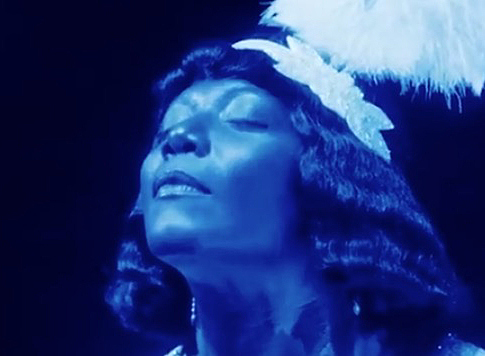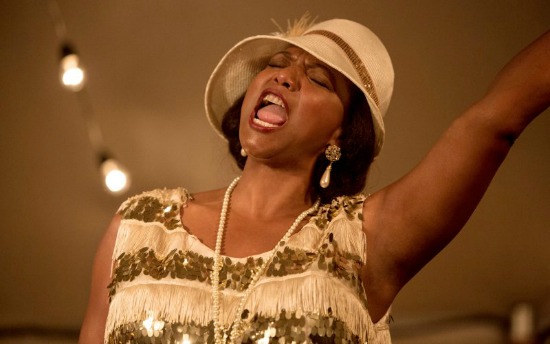Written by Lisa Bolekaja.
See-line woman
Wiggle wiggle
Turn like a cat
Wink at a man
And he wink back
Now child
See-line woman
Empty his pockets
And wreck his days
Make him love her
And she’ll fly away
Writer/director Dee Rees opens the film Bessie with the Nina Simone classic “See-Line Woman” playing as the camera takes in Queen Latifah in close-up, her face drenched in resplendent blue lighting. The color, framing and music told me from jump that the narrative would be coming from a place of womanist Blackness. Nina Simone, the High Priestess of Soul, was signifying musically the proper introduction to Bessie Smith, the woman known in her day as the Empress of the Blues.
The story of Bessie Smith has been a long time coming, and it was quite timely that she should be given her due just a few days after the passing of the Blues legend B.B. King. Most people know very little about Bessie Smith, and it is almost a given that biopics are never truly satisfying, typically following a rise to fame and falling into trouble narrative. All I wanted to know was, would Rees be true to the highly unorthodox life of Smith? Or would we be subjected to a safe narrative that tip-toed around the raunchy, bisexual and profane realness of the Bessie Smith I read about in college?
Rees kept it real. Bessie is one of the rare mainstream films that shows an unapologetically Black, female and queer protagonist. That alone is groundbreaking in an otherwise straightforward biopic. Within ten minutes of the film, we see Bessie fooling around with a male paramour whom she beats up after he gets a little too fresh for her tastes, and then we see her in bed with her longtime female lover, Lucille (the gorgeous Tika Sumpter). It comes off natural, not some forbidden plot device to be used later to create conflict. It is what it is, and Bessie doesn’t waste time fretting over it. When she jumps on a train owned by Ma Rainey (Mo’Nique) to beg for a singing job and observes Ma interacting with her own female lover who prances around comfortably topless, Ma asks her straight out, “Watchu know about it?” Bessie tells her, “Same thing you do.” And that is that.
It was very powerful to see Black queer women openly affectionate with one another, and openly sexual in private spaces, especially for that time period. Black queer women, hardly ever get to see themselves on film without the narrative making them act secretive of fearful. Throughout the viewing, I kept waiting for Bessie’s bisexuality to become a big issue with her family, her band, or even her husband (and many lovers). It didn’t.
Ma Rainey takes Bessie under her wing, teaches her the ropes and how to sing the Blues to make the audience want more. She even teaches Bessie how to dress as a man and enjoy the thrill of smoking and gambling with men dressed that way. It reminded me of the stories I read that told of private clubs where women could be gender fluid and embrace masculine expressions without fear of bodily harm from violent homophobes.
Black love in all forms is front and center, and a new love comes in the form of Jack Gee (Michael Kenneth Williams being fierce and nuanced in this role), a man who sees Bessie perform, and goes to her hotel uninvited. As Bessie lies in bed, still in her nightgown and headscarf, her brother and business partner Clarence (Tory Kittles) watching her back, Jack Gee tells her his personal stats and proclaims without haste, “I’m auditioning to be your man.” He’s bold as brass and Bessie eventually marries him, and keeps her girlfriend Lucille too.
Jack seems very much Bessie’s equal, and they do go toe to toe with their hard loving, hard fighting and hard drinking. It’s a fragile relationship that hinges on Bessie’s Achilles heel, which is a bottomless hunger that stems from the loss of a mother at an early age, and the dysfunctional relationship she has with her older sister Viola (Khandi Alexander). Viola used to lock up food in the family refrigerator and beat on Bessie. This back-story told in flashbacks is the key to Bessie’s insatiable need for more success, more money, more lovers, and more control over her family. She eventually buys a large house without telling Jack, bringing everyone (including her sister Viola and Lucille) under one roof. She ignores her husband’s complaints and forces her will on everyone. She will live the life she felt was denied her, and even brings home a little boy on Thanksgiving to be her and Jack’s son. It’s Bessie’s world and everyone is expected to fall in line and gravitate around her.
The best part of Bessie is how she handles the intrusion of the White Gaze on the storyline. Bessie’s world seems insulated from white intrusion, and this allows us to focus on the Black characters just being themselves without having to focus on the known and ubiquitous racism. Whiteness does seep in through the colorism issues that Bessie encounters with the infamous paper bag test (Black performers, even in Black entertainment spaces of the period, did not hire darker skinned Black women who were not lighter than a paper bag). White intrusion is most prominent in two scenes, one involving the Klan showing up at one of Bessie’s performances, and the other at a prominent white patron’s home.
In the Klan sequence, Bessie simply walks outside and cusses the white men out and chases them away. She doesn’t quake in her boots or shrink behind the protection of Black men. She then turns around and goes back to performing, winning over the respect of the frightened Black men and women who were prepared to run away from White terrorism intruding onto Black space. In the home of Carl Van Vechten (Oliver Platt), a controversial patron of Negro artists whom he finds crude, primitive, and folksy, Bessie turns the White Gaze (and cultural appropriation) on its head by being true to her unfiltered Blackness. When a white woman puts her hands on Bessie in an attempt to hug her and says, “I heard that you were wild,” Bessie pushes her away and says, “Get the fuck off me.” Bessie in one fell swoop refused to let the white woman turn her body into a commodity. She turns on Carl Van Vechten too when he tells her about his book Nigger Heaven. This is a tremendous sequence because Bessie doesn’t allow the White characters to hijack the narrative and center the story on Bessie having to impress Van Vechten to get something from him for her survival. Bessie doesn’t give a fuck about anyone in that room except for herself and the two lovers she brought with her. In fact, Bessie doesn’t even care what Langston Hughes (Jeremie Harris) has to say when he tries to warn her about Van Vechten’s fetishizing of Black culture and Black people.
I found it fascinating watching Hughes take in Bessie’s behavior towards Van Vechten, because Hughes had to depend on White patrons much like Van Vechten to supplement his income in order to write and survive. Bessie didn’t. She had her voice and she had regular working class Black people who came out to see her when she travelled. Eventually she made records, (there’s the hilarious moment where she goes to a Black record company called Black Swan Records and discovers the company isn’t as Black as she thought, and that she is too Black for them), and was able to gain new revenue from vinyl sales. Bessie never had to water down her personality to make White folks feel comfortable. Unfortunately Hughes and other writers of their time (like my favorite Harlem Renaissance writer, Zora Neale Hurston) had to walk a thin line of creating the art they wanted without offending Whites who funded that art. It still happens today. Recently, poet and Buzzfeed Literary Editor Saeed Jones wrote about this same issue with his recent piece Self-Portrait Of The Artist As Ungrateful Black Writer.
Bessie is a good primer movie for people who know nothing about Bessie Smith, and it is a breakthrough performance for Queen Latifah. The cast is flawless and I expect Emmy nods for Queen Latifah, Mo’Nique and Khandi Alexander. (Khandi can do anything and just be dynamite. Period.) It was a pleasure watching unapologetic Black, female, queerness. I hope HBO takes more chances on projects like this. Somebody get Dee Rees financing for a new movie stat. It is maddening to think that she hasn’t had an opportunity since Pariah in 2011 to show us her voice. She has more radical stories to tell. I can feel it.
See also at Bitch Flicks:
Bessie: A Mainstream Portrait of Black Queer Women by a Black Queer Woman
Mo’Nique Returns to the Spotlight in Bessie
Staff Writer Lisa Bolekaja can be found being an unapologetic raconteur as co-host of the Screenwriting Podcast Hilliard Guess’ Screenwriters Rant Room. Her latest Sci Fi short story is in the newest issue of Uncanny Magazine. She’s on Twitter @LisaBolekaja.













